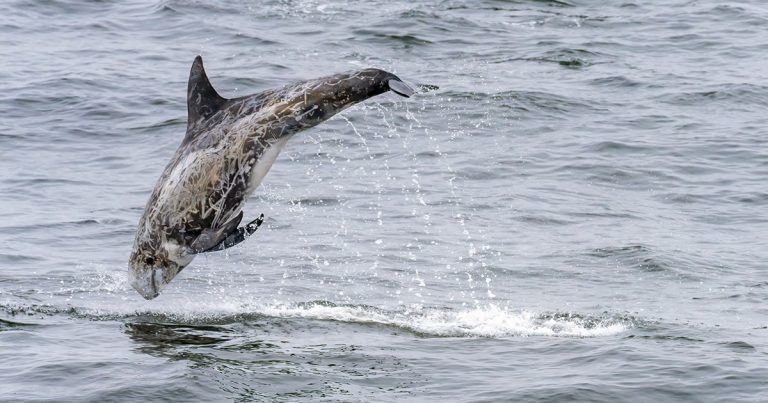21 Dec 2022
Pan-Scottish research studied 22 odontocetes stranded in Scottish coastal waters and found four animals in three different species had brain changes associated with the disease in humans.

The Risso’s dolphin was one of the species included in the study. Image © kcapaldo / Adobe Stock
A study has found the brains of three different dolphin species stranded off the Scottish coast showed signs of human Alzheimer’s disease.
Scientists believe the findings, in the most extensive study into dementia in odontocetes (toothed whales), could provide an answer to unexplained live-stranding events in some species.
Research was carried out in a collaboration between the University of Glasgow, The University of Edinburgh, the University of St Andrews and the Moredun Research Institute on the brains of 22 odontocetes stranded in Scottish coastal waters.
The study, published in the European Journal of Neuroscience, included five different species – the Risso’s dolphin, long-finned pilot whale, white-beaked dolphin, harbour porpoise and bottlenose dolphin – and found four animals from three of the dolphin species had some brain changes associated with Alzheimer’s disease in humans.
Authors of the study confirmed the results could support the “sick leader” theory, where a healthy pod of animals finds itself in shallow waters after a group leader becomes lost or confused.
Whales, dolphins and porpoises become stranded regularly around the coasts of the UK, and while many are moved to safety, others perish. The underlying causes of the strandings are being studied.
In the study, presence of brain pathology hallmarks of Alzheimer’s disease was examined – including formation of amyloid-beta plaques, the accumulation of phospho-tau and gliosis. The results reveal that the brains of all of the aged animals studied had amyloid-beta plaques.
Three animals in particular – each from a different odontocete species – had amyloid-beta plaques and a number of other dementia-related pathologies in their brains, showing some odontocete species develop Alzheimer’s-like neuropathology.
However, the study cannot confirm whether any of the animals would have suffered with the same cognitive deficits associated with clinical Alzheimer’s disease in humans.
Lead researcher Mark Dagleish, from the University of Glasgow, said: “These are significant findings that show, for the first time, that the brain pathology in stranded odontocetes is similar to the brains of humans affected by clinical Alzheimer’s disease.
“While it is tempting at this stage to speculate that the presence of these brain lesions in odontocetes indicates that they may also suffer with the cognitive deficits associated with human Alzheimer’s disease, more research must be done to better understand what is happening to these animals.”
Co-author Frank Gunn-Moore, from the University of St Andrews, added: “I have always been interested in answering the question: do only humans get dementia? Our findings answer this question as it shows potential dementia-associated pathology is indeed not just seen in human patients.”